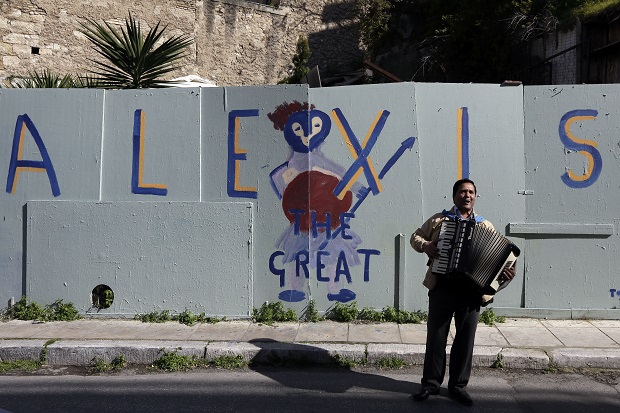Little sympathy for Greek woes in eurozone’s poorer nations

A busker plays music in front of a graffiti that refer to Greece’s Prime Minister Alexis Tsipras in the traditional Plaka district of Athens on Saturday, Feb. 21, 2015. Greece’s government starts working on drafting a series of economic reforms it must present to the other euro zone finance ministers on Monday, as part of an agreement reached Friday to extend the country’s European loan agreement. AP
WARSAW, Poland – After painful market reforms and austerity under their belts, the poorer ex-communist nations of the eurozone have little sympathy for Greece’s latest debt woes — with some even insisting the bloc could survive a “Grexit”.
Estonia, Latvia, Lithuania and Slovakia maintain that Greece should stick to the austerity measures laid out in its massive 240 billion euro ($273 billion) bailout.
The four nations had to impose their own difficult reforms to shake off communist-era economies and crippling recessions and think Greece should bite the bullet and overhaul its economy.
“In Latvia we went off the rails too, but we knew what we had to do to get back on track. We learned our lesson — why can’t the Greeks learn the same lesson?” Latvian pensioner Maiga Majore, 71, told AFP.
“Of course I feel sorry for pensioners and people without jobs. But my pension is 270 euros a month. How much do they get? More I bet.”
Article continues after this advertisementAt a last-ditch meeting on Friday, Europe gave Athens some breathing room to present alternative reforms in a bid to save its crucial financial lifeline.
Article continues after this advertisementBut the new leftist Greek government, which came to power last month pledging to end deeply unpopular austerity measures, was given just two days to submit proposals that will satisfy its sceptical eurozone peers led by paymaster Germany.
Former Lithuanian prime minister Andrius Kubilius points out that he accepted a 25-percent salary cut as premier in 2009 while overseeing an austerity drive during the global financial crisis.
“Austerity policy was the only real cure for us, and I see no reason why Greece should think that it wouldn’t work for them too,” he told AFP.
Too poor to pay
Slovakia argues that it is too poor to pay for the mistakes of richer members of the eurozone, which the east European country of 5.4 million people joined in 2009.
A piece of sarcasm popular on Slovak social media sums up the frustration with Greece: “Adopt a Greek for 500 euros. He’ll do everything you don’t have the time for: sleep until noon, drink coffee, take a siesta and in the evening he will even go to the bar for you. At last, you’ll have the time to work two jobs.”
One user in a “Grexit” debate on the website of Slovakia’s top-selling SME daily ranted: “They (Greeks) should start to work hard to pay their debts like everyone else.
“I definitely wouldn’t give Greece another penny,” said another user in the same forum.
Slovakia’s leftist Prime Minister Robert Fico agrees. “This is a red line for us. It would be impossible to explain to the public that ‘poor’ Slovakia . . . should compensate Greece,” he told the Financial Times before Friday’s last-minute agreement in Brussels.
Both Slovakia and Estonia said this week that they were unfazed by the possibility of Greece exiting the euro since mechanisms for financial stability were set up in recent years that could ensure the bloc’s survival.
The eurozone’s smallest member since 2011, Estonia approved an initial Greek bailout but has insisted that all eurozone members adopt its trademark hardline fiscal discipline.
‘Other nations suffer too’
In Tallinn there is little support for Greece’s aversion to austerity.
“If we owed so much money to others and had received so much from them, we would keep quiet and try to be as polite as possible… to ensure a best possible solution,” Estonian liberal MEP Kaja Kallas said this week.
“Their (Greece’s) stance is that you owe us, our people are suffering, you have done us injustice. They ignore the fact that other nations suffer too.”
All three ex-Soviet-ruled Baltic states implemented drastic austerity measures to recover from deep recessions triggered by the 2008-9 global financial crisis, paving the way to eurozone entry and stable economic growth, now around three percent in the region.
Latvia and Lithuania are the eurozone’s newest members, having joined in 2014 and 2015 respectively, and were not part of the initial Greece bailout decision.
RELATED STORIES
Eurozone issues Greece an ultimatum; Athens hopeful of deal
Greece puts brave face on negotiations with creditors